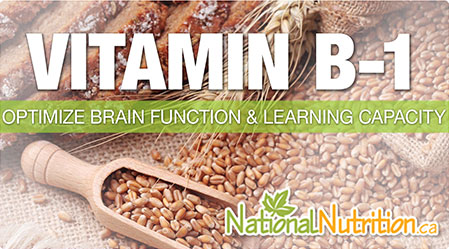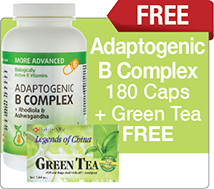
B-1 is found in whole grains, but it is often depleted from cooking
Vitamin B-1
Updated Mar. 09th, 2022
What is it?
Thiamine is a water-soluble B vitamin also known as vitamin B1. Once absorbed by the body, thiamine is converted to thiamine pyrophosphate (TPP), its active coenzyme form. In this form thiamine is a cofactor in many chemical reactions throughout the body.
Forms of Thiamine
In general, thiamine can be seen in supplements as TPP, benfotiamine, and thiamine HCl (plain thiamine). Unfortunately, the direct supplementation of TPP does not provide added benefit, as the molecule is stripped of its phosphate groups during digestion and is absorbed only as thiamine. Thiamine absorption is controlled by transport molecules in the digestive tract and in the membrane of each cell. Uptake of thiamine by these molecules is limited to approximately 12mg of thiamine per time. Interestingly, another form of thiamine, known as "benfotiamine" is a thiamine precursor that is more readily absorbed across the digestive tract and into cells, which is then quickly converted to TPP. For more information on benfotiamine, please click here.
Brain and Nerve Cells
By acting as a cofactor in various cellular reactions, thiamine enhances the circulation of blood to the brain and maintains the function of nerve cells. This allows thiamine to play a role in optimizing brain function and learning capacity.
Metabolism and Body Maintenance
Thiamine is also required for the formation of red blood cells, to allow for proper oxygen transport throughout the body. It also is required for the formation of stomach acid to allow for proper digestion. Thiamine helps to regulate muscle activity and ensures proper tone of both the digestive tract and heart. Energy, growth and normal appetite all depend on thiamine availability.
Antioxidant
Thiamine is also an antioxidant, which means that it protects the body from damage due to free radicals, which we are exposed to by a variety of sources in everyday life. Free radicals are unstable molecules with an unpaired electron that are extremely reactive, and damage surrounding cell membranes, fats, and fat-soluble vitamins and nutrients. For more information on antioxidants and free radicals, please click here.
Co-Supplementation
Vitamin B1 is absorbed in the small intestine by a transport molecule that requires folic acid. As such, supplementation with folic acid while supplementing with vitamin B1 is often a good idea. For more information on folic acid, please click here. All of the B vitamins work together and are best used by the body in a B complex. B complex supplements generally include vitamin B1.
Vitamin B1 Deficiency
Deficiency in thiamine is a condition known as "beriberi", which comes in two main forms in adults: dry and wet. Dry beriberi appears as reduced sensation and/or tingling in the hands and feet, as well as impaired reflexes and irregular movement in the arms and legs. Wet beriberi appears as mental confusion, edema, heart failure, and wasting of the muscles. Vitamin B1 deficiency is rare in Western society, and is generally seen only in alcoholics, as Wernicke-Korsakoff syndrome. This syndrome appears as deterioration of brain function, paralysis of eye movements, abnormal stance, and memory loss. Thiamine deficiency can also result in blindness due to death of the optic nerve, the major nerve that carries visual information from our eyes to our brain. In general, elderly people and those with impaired digestion tend to be slightly deficient in most B vitamins.
How do I get more B1?
All of the B vitamins work together and are best used by the body in a B complex, which is why many B complex supplements include thiamine in them. If more supplementation of thiamine is needed it should be taken in addition to a good B complex. Most B vitamins are water-soluble so any extra from a large dose is easily flushed out of the body. Because of this, it is best to take lower dosages of a B complex several times a day, rather than one large dose. Spray or sublingual forms of B vitamins are easily absorbed, as are capsules - if your digestion is healthy, then the tablet form is usually suitable for most people.
Important Information
B1 is depleted by the use of antibiotics, sulfa drugs, oral contraceptives and anti-seizure medications, like Dilantin. Heavy consumption of alcohol, caffeine and sugar decrease levels of thiamine in the body. Dosages exceeding 300mg daily can be associated with liver damage, tremors, edema and rapid heart rate.






















I felt like I was back in organic chemistry reading this article-in a good way! It's unfortunate that one can't get an added benefit from direct supplementation of TPP with the molecule is stripped of its phosphate groups during digestion and is absorbed only as thiamine but great that another thiamine form, benfotiamine, is more readily absorbed across the digestive tract and then into cells, where it can be summarily converted to TPP. Thanks for adding the note that the B1 transporter requires folic acid-it makes sense why those two vitamins are often paired together in supplements now!
Hello Rachel,
I'm glad to hear that you found the article reminiscent of your organic chemistry days. Understanding the intricacies of how molecules are absorbed and utilized by the body can be fascinating. It's indeed unfortunate that direct supplementation of TPP doesn't provide added benefits due to its stripped phosphate groups during digestion. However, it's great to know that benfotiamine, another form of thiamine, is more easily absorbed and converted to TPP within cells. You can discover more about benfotiamine by reading this article, https://www.nationalnutrition.ca/articles/supplements/benfotiamine/
Happy reading!